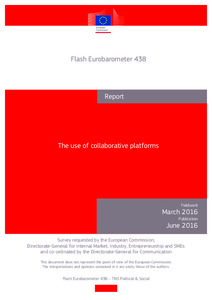The use of collaborative platforms
"Collaborative platforms are internet-based tools that enable transactions between people providing and using a service. They can be used for a wide range of services, from renting accommodation and car sharing to small household jobs. These platforms are part of the wider phenomenon of the so-...
| Institution: | ETUI-European Trade Union Institute |
|---|---|
| Format: | TEXT |
| Language: | English |
| Published: |
Brussels
2016
European Commission |
| Subjects: | |
| Online Access: | https://www.labourline.org/KENTIKA-19103401124919216839-The-use-of-collaborative-platf.htm |
| _version_ | 1771659895838343169 |
|---|---|
| collection | Library items |
| description | "Collaborative platforms are internet-based tools that enable transactions between people providing and using a service. They can be used for a wide range of services, from renting accommodation and car sharing to small household jobs. These platforms are part of the wider phenomenon of the so-called ‘collaborative economy’, which has the potential to provide opportunities for Europe to create growth, jobs and benefits for consumers. However, from a public policy perspective, there is a need to address obstacles and uncertainties that can hamper the growth of new business models. For this reason, in the context of the Single Market strategy (SMS), the European Commission is currently assessing the regulatory framework in which collaborative platforms operate. The first step of this review has been a public consultation on platforms, online intermediaries, data, cloud computing, and the collaborative economy more generally, which ran from the 24th September 2015 to the 6th January 2016 and involved all the relevant stakeholders2. As part of this effort to better understand the role of collaborative platforms in the collaborative economy environment, this survey seeks to shed light on citizens’ perceptions, attitudes and practices in relation to these internet-based tools. The first chapter provides an overview of the European Union citizens’ awareness and frequency of use of collaborative platforms. The second chapter focuses on the use of platforms to provide services in EU countries. Finally, the third chapter presents the EU citizens’ views on the main advantages and disadvantages of collaborative platforms compared to traditional ways of buying and selling goods or services" |
| format | TEXT |
| geographic | EU countries |
| id | 19103401124919216839_3a0d5194a1a9434f8e6ca7d1c4fd9b0f |
| institution | ETUI-European Trade Union Institute |
| is_hierarchy_id | 19103401124919216839_3a0d5194a1a9434f8e6ca7d1c4fd9b0f |
| is_hierarchy_title | The use of collaborative platforms |
| language | English |
| physical | 37 p. Digital |
| publishDate | 2016 |
| publisher | Brussels European Commission |
| spellingShingle | information technology innovation Internet service sector digitalisation sharing economy The use of collaborative platforms |
| thumbnail | https://www.labourline.org/Image_prev.jpg?Archive=106532492471 |
| title | The use of collaborative platforms |
| topic | information technology innovation Internet service sector digitalisation sharing economy |
| url | https://www.labourline.org/KENTIKA-19103401124919216839-The-use-of-collaborative-platf.htm |

